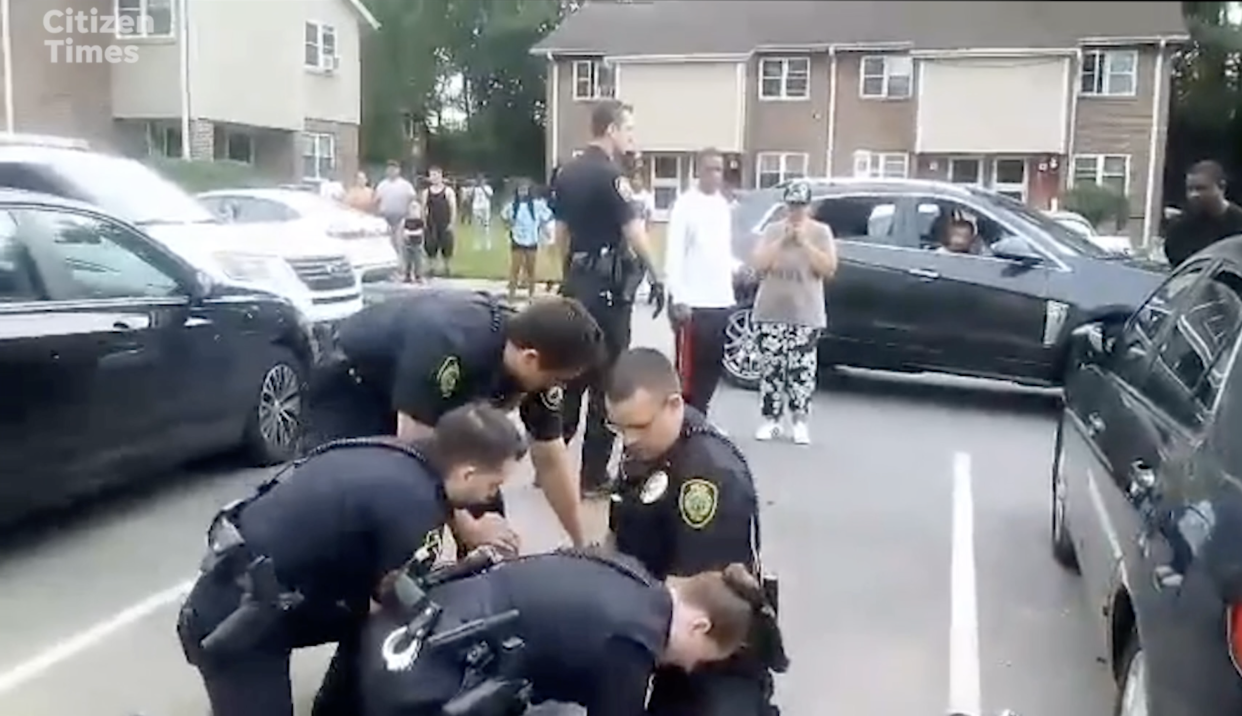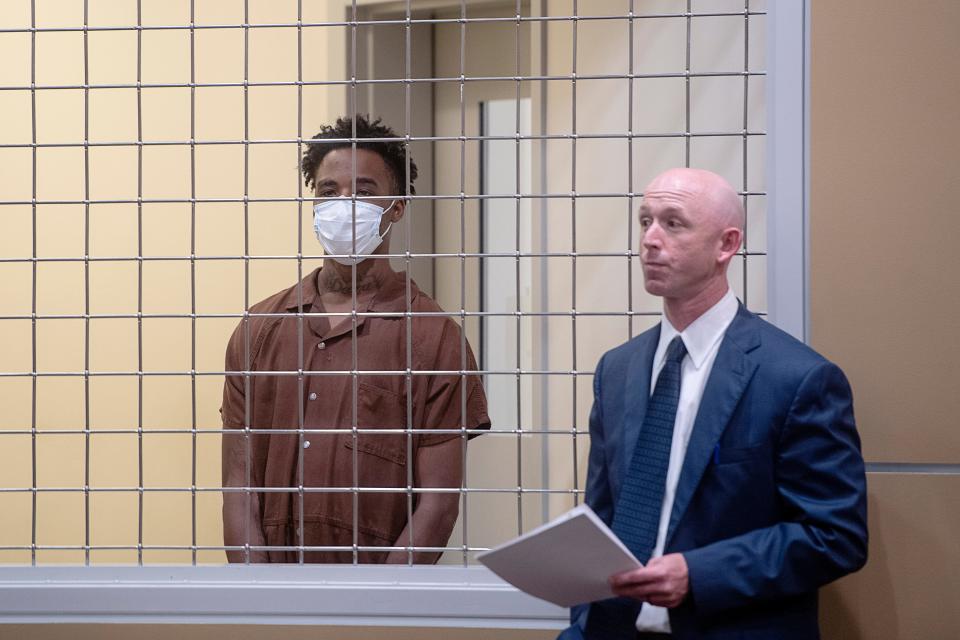Mother of Asheville man in violent arrest criticizes APD actions; asked for medical help

ASHEVILLE - A Black man whose violent May 13 arrest led to allegations of excessive force by white officers suffers from multiple mental health problems, including hallucinations, and was traumatized by viewing videos of his arrest in court, according to attorneys in his case.
The latest developments in the aftermath of Devon Whitmire's arrest came at a June 2 Buncombe County District Court hearing in which a judge denied a request by Whitmire's attorney to reduce his $85,000 bond. Chief District Court Judge Calvin Hill also denied a prosecutor's request at the hearing to raise the bond.
After the court hearing Whitmire's mother spoke with the Citizen Times, faulting Asheville police officers on how they handled the arrest.
Whitmire, 27, appeared in court but did not speak, standing behind a secured area with bars. He remains in the county detention facility charged with multiple counts of assault, including assault on a government official inflicting serious injury. Prosecutors say they will ask a grand jury to indict him, something that could happen by June 9, moving his case to Superior Court.

More: Watch now: Asheville police release bodycam footage of Whitmire arrest
The day of the arrest, Asheville Police Department officers were in the Erskine-Walton neighborhood south of the River Arts District and said they recognized Whitmire as having an open warrant for communicating threats. He appeared to make no threatening motions in a camera phone video taken by his fiancee, with one arm in a sling and a phone in his other hand while he leaned on a car, wearing flipflops.
But after asking the three APD officers surrounding him to "back up" so he could remove a gun, they grabbed him and a struggle ensued on the ground.
The struggle continued even after Whitmire was handcuffed as officers tried to search him. While Whitmire initially said he was armed, he said multiple times during the struggle he didn't have a gun, something borne out by the search. It's not clear why he said he had a weapon.
More: Can you film police in North Carolina? Everything you need to know about your rights
The bystander video showed an officer at one point using an "arm bar" across Whitmire's neck while he lay on the ground, something the Citizen Times described as "pinning" ― but that police recently disputed in an edited video of the incident.
In video footage, members of a group of neighbors that APD characterized as "hostile" can be heard growing increasingly upset, with some shouting that officers were "doing too much" and "he can't breathe," drawing comparisons to some high-profile fatal police encounters with Black men.
While the arm restraint appeared to meet APD's definition of a chokehold, a form of lethal force, police officials and District Attorney Todd Williams said no department policies or laws appear to have been broken.
At a previous hearing, at which a bond reduction was also denied, Judge Edwin Clontz faulted Whitmire for lying about his identity and struggling ― but also said police were wrong to lay hands on him before asking him to submit. Clontz declined to talk about the neck hold at the May 22 hearing, saying that was for later proceedings.
Public Defender Brooks Kamczik at the June 2 hearing said police used excessive force and that Whitmire's air supply was "being cut off." But Kamczik said that he would not show bystander and police body camera videos again at Whitmire's request.
"I think it's traumatic for Mr. Whitmire," he said, adding that when videos were shown previously in court, "he was not able to stand here with me," and instead sat on a bench out of view and asked that videos be stopped.
In arguing for a higher bond, Assistant District Attorney Katie Kurdys said there was no excessive force and that actions of officers "were perfect under the circumstances."
Whitmire had allegedly threatened to kill some family members and his mother had told officials he had mental health issues, Kurdys said, "specifically, multiple personality disorder, schizophrenia, manic depression and hallucinations." His mother also said he had not been taking his medication, she said.
While his mental health problems had been discussed before, it was the most detailed description of Whitmire's illnesses.
More: EBCI Chief signs law making Cherokee Indian Police bodycam videos not open to public
Family had sought to have Whitmire involuntarily committed and an order to do so existed at the time of his arrest. Kurdys noted a 911 call from Whitmire's mother "pleading for help," saying "we've been calling, I got the (Involuntary Commitment Order) but he hasn't been served. He is dangerous."
Kamczik, though, faulted police for not being able to find Whitmire for the involuntary commitment when he could have been taken to the hospital ― but being able to "find him very quickly" to serve the communicating threats criminal warrant.
Mother: police video misleading
Seeking to offer a counter-narrative to media coverage based on the bystander video, the city got a May 22 court order allowing public release of officer bodycam footage. Along with raw videos, the city posted a produced piece including maps and the 911 recording of Conita Whitmire's 911 call.
Speaking to the Citizen Times after the June 2 hearing, Conita Whitmire said that the produced video was misleading because it gave the impression she was seeking her son's arrest, when she only wanted his commitment to the hospital.
"We were just trying to get help getting him to the hospital because we knew he wasn’t going to go willingly," she said.
Chief David Zack did not respond to a message seeking comment.
Also on the produced video was a segment seeking to counter the idea Whitmire's neck was pinned.
Text inserted into the edited video notes when Whitmire, who is barefoot, kicks and spits at officers. A still shot taken from the video by Whitmire's fiancee ― and used by the Citizen Times ― shows two male officers restraining Whitmire who is on his back in handcuffs while Officer Shelby Middleton puts her arm across his throat.
Inserted text says that 15 seconds before that, Middleton had her arm under Whitmire's head and that a second after the still shot, Whitmire lifted his head, "indicating he was not pinned by the neck."
According to APD's use of force policies, a chokehold, a form of lethal force to be avoided except in life-threatening situations, "includes, but is not limited to, any pressure to the throat or windpipe, which may prevent or hinder breathing or reduce intake of air."
Conita Whitmire said the hold should not have been used.
"What was your justification for doing that? Even after they had him in cuffs," she said.
Joel Burgess has lived in WNC for more than 20 years, covering politics, government and other news. He's written award-winning stories on topics ranging from gerrymandering to police use of force. Got a tip? Contact Burgess at jburgess@citizentimes.com, 828-713-1095 or on Twitter @AVLreporter. Please help support this type of journalism with a subscription to the Citizen Times.
This article originally appeared on Asheville Citizen Times: Asheville man in violent arrest 'hallucinated'; neck pin dispute

